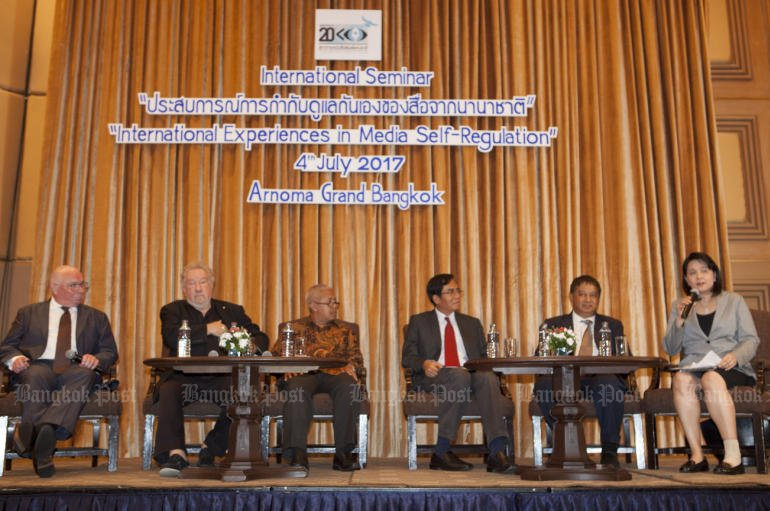
Civil society needs to be involved in the self-regulatory mechanism of the media since public participation will strengthen the mechanism said media self-regulation experts.
Representatives from media self-regulatory bodies from Australia, Indonesia, Myanmar and Sweden spoke Tuesday at an international seminar marking the 20th anniversary of the National Press Council of Thailand (NPCT) in support of self-regulation over state control.
"Self-regulation works. We have had it for more than a hundred years. I think there is a strong consensus among Swedish society, politicians, the public, and the media industry [that] self-regulation is helpful in building ethical consciousness among the media industry," said Swedish Press Ombudsman Ola Sigvardsson.
David Weisbrot, outgoing chairman of the Australian Press Council, said participation from stakeholders is key to keeping the mechanism going well.
"In Australia, there were about 700 complaints last year. The number of complainants also rose about 800% in three years. It seems to me that they are using the system, willing to complain," he said.
"It's not just journalists, editors, or the press council. It's members of the public that are willing to work, take their time to fill out the form and bring these things to our attention. Members of the public, if they want it [self-regulation] to work, they need to be involved," he added.
The speakers emphasised the link between the self-regulatory system, freedom of the press and transparency.
"All countries that rank among the top in the Freedom of the Press Index have a self-regulatory system. Compare that list to the list from Transparency International that measures corruption in countries all over the world. You can see that first five of that are the same [countries]. So, if you really want to get rid of corruption, let the press be free," Mr Sigvardsson said.
After investigation, Mr Sigvardsson's council seeks to bring about an outcome acceptable to both the complainant and the publication and make an adjudication calling for remedial action by the media outlet's publisher.
However, the council has no power to order compensation, fines or other financial sanctions.
The measures motivate good behaviour among the media in a more effective way than using other measures, he said.
On July 4, 1997, the owners and editors of 25 Thai and English newspapers (out of a total of 32), as well as 10 press organisations signed a memorandum of intent to establish a national press council for self-regulation among the members, promote press freedom and responsibility, and improve the standard of press professionals to support sections 40 and 41 of the 1997 constitution, which emphasised independence of the press and freedom of expression.
However, the current military government-sponsored National Reform Steering Assembly has proposed a law that it said will improve the standards of Thai media, in which permanent secretaries from the PM's Office and Culture Ministry will be among the members of a national professional media council, which is authorised to examine and punish media professionals.
The proposal has raised concerns of impacts on media freedom.
A group of 30 media organisations including the NPCT see the bill as hostile towards a free press and in breach of several charter provisions.
The bill would put the media at risk of interference, the group said.